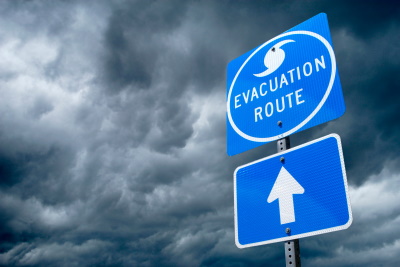Even though the official hurricane season begins June 1 and runs through Nov. 30, peak hurricane season for those of us on the Atlantic Ocean starts late August and spills into October. Remember Hurricane Hugo that hit Charleston, SC, on Sept. 22, 1989? It’s still one of the strongest hurricanes to hit South Carolina.
Personal preparation
Your first priority in a serious weather event is getting yourself and your family to safety. In the event of an evacuation, you’ll need to gather family members and pets and be prepared to leave your home – potentially for several days.
Before an evacuation order hits, go ahead and make your plans. Know the evacuation route, fill the car with gas and figure out where you’re going to go. Do you have friends or family in a neighboring state? Should you make a hotel reservation several hours away? The roads will be crowded, the hotels booked and patience at an all-time low, so don’t leave anything to chance.
Depending on the severity of the storm, you may not be able to return home for several days so pack accordingly. Make sure you have clothing and toiletries as well as any needed medications and plenty of food and water for your pets.
You’ll also want to have some important documents with you, such as medical insurance cards or details on your homeowner’s insurance, including the company’s contact info. Because you may be limited on space, scan key documents and save them onto a USB flash drive you can take with you. This way you’ll have all the information you may need without having to pack up half your filing cabinet.
Securing your home
As you prepare for peak hurricane season in South Carolina, don’t forget to secure your home. A strong hurricane can pack a punch with high winds and torrential downpours of rain. Your house – likely your biggest asset – is sitting right in the middle of the storm so it’s susceptible to potentially significant damage.
Do what you can to minimize the damage to your home:
- Use plywood to cover the windows. They are most likely to be damaged in a hurricane and broken windows makes it easy for all that rainwater to come blowing in and cause more problems.
- Bring your outdoor items inside, including patio furniture, potted plants, bikes, toys and grills. These items can easily be swept up in the winds and cause damage to your home or someone else’s.
- If you have valuable items or high-end electronics, consider taking them with you if you’re evacuating or move them to higher ground in case your first floor is flooded.
If you’re evacuating and planning to ride out the storm or even if it’s a severe tropical storm, have your hurricane supply kit ready. Make you have flashlights and extra batteries. Stock up on bottled water and fill the bathtub with water. Have non-perishable food items available in case the power goes out and you’re unable to cook a meal.
Lastly, make sure you understand your homeowner’s insurance policy. Many people assume their basic insurance policy covers damage from a flood and that’s simply not the case. Even if you’re not in a designated flood zone and required to have additional flood insurance, you may want to invest in a policy. Hurricanes almost always leave flooding in their wake so make sure you have the necessary protection.
The one positive of a hurricane is that you have a few days to prepare, but why scramble in those days leading up to a storm? Go ahead and get ready now before peak hurricane season in South Carolina hits.
Learn more about Manning Insurance Services’ Homeowner Insurance Policies.

